AI automation is transforming digital marketing, but many businesses struggle to implement it effectively. This article explores how AI automation enhances marketing strategies, improves efficiency, and drives results.
We’ll examine practical applications of AI in SEO, PPC ads, and content creation, showcasing real-world examples from UPMAX‘s experience. By the end, you’ll understand how to leverage AI automation systems to streamline your marketing efforts and achieve better outcomes.
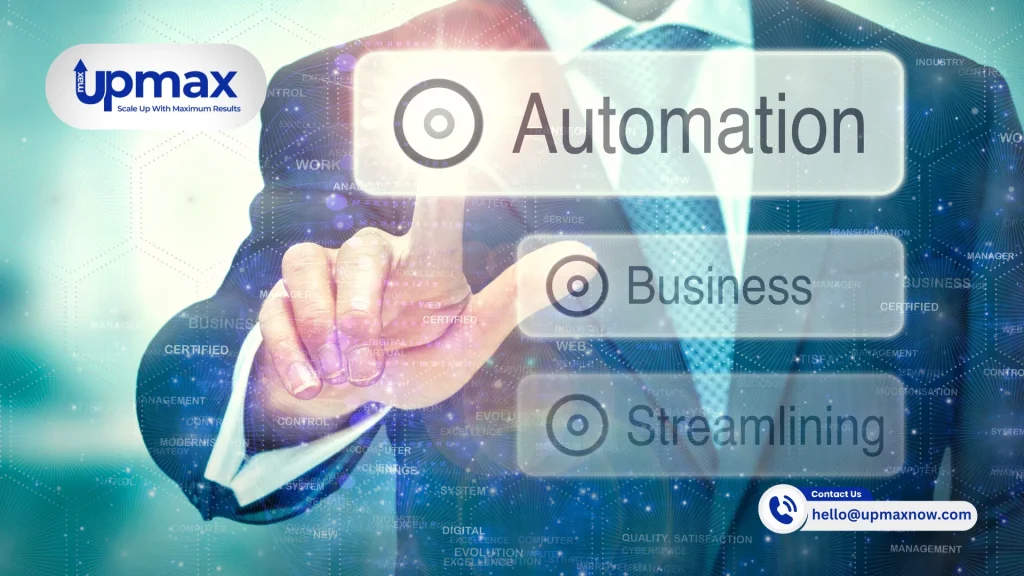
Key Takeaways for Maximizing Efficiency: AI Automation in Digital Marketing
- AI Automation Enhances Efficiency: AI automation significantly improves digital marketing efficiency by utilizing data analysis, personalization, and campaign optimization.
- Strategic Implementation is Crucial: Successful AI integration requires careful tool selection, ongoing updates, and a balance between automation and human involvement.
- Customized Solutions Yield Results: Upmax Digital Marketing has demonstrated that tailored AI solutions can substantially improve rates and sales cycles.
- Continuous Learning is Essential: Marketers must stay abreast of AI trends and invest in training to fully leverage automation’s advantages.
- Streamlined Processes Provide Competitive Edge: AI-driven strategies streamline marketing processes and enhance customer experiences, offering businesses a competitive advantage.
- Understanding AI’s Role in Marketing: AI automation encompasses various technologies that optimize marketing tasks such as CRM services, social media management, and SEO.
- Advanced Data Analysis Capabilities: AI tools enable rapid processing of large datasets, allowing marketers to quickly uncover trends and make informed decisions.
- Personalized Customer Interactions: Automation facilitates personalized marketing efforts by analyzing customer data to deliver tailored content and recommendations.
- Campaign Management Simplified: AI tools automate numerous aspects of campaign management, from content creation to performance analysis, freeing marketers to focus on strategy.
- Key Features for AI Tools: When selecting AI solutions, prioritize features like process mining, seamless integration with existing systems, and comprehensive management capabilities.
- Measuring Success with KPIs: Establishing key performance indicators (KPIs) is vital for assessing the effectiveness of AI automation in enhancing marketing strategies.
- Real-World Success Stories: Companies like Netflix and Amazon exemplify successful AI implementation in digital marketing through personalized recommendations and optimized supply chain management.
Understanding the Role of AI Automation in Digital Marketing
AI automation in digital marketing integrates advanced technologies to streamline processes and enhance efficiency. This section explores the definition of AI automation in marketing contexts. It examines key components, including website optimization, web development, and ad management for platforms like Meta Ads and Google Ads. Understanding these elements is crucial for maximizing marketing effectiveness through AI-driven solutions.
Defining AI Automation in the Context of Marketing
AI automation in marketing refers to applying artificial intelligence technologies to streamline and enhance various marketing processes. This includes automating tasks in CRM services, social media management, and search engine optimization (SEO), allowing marketers to focus on strategic decision-making and creative aspects of their campaigns.
The integration of AI in marketing automation extends beyond essential task management to include advanced data analysis and predictive modeling. By leveraging machine learning algorithms, AI-powered marketing tools can optimize campaign performance, personalize customer experiences, and provide actionable insights for improved marketing strategies across multiple channels.
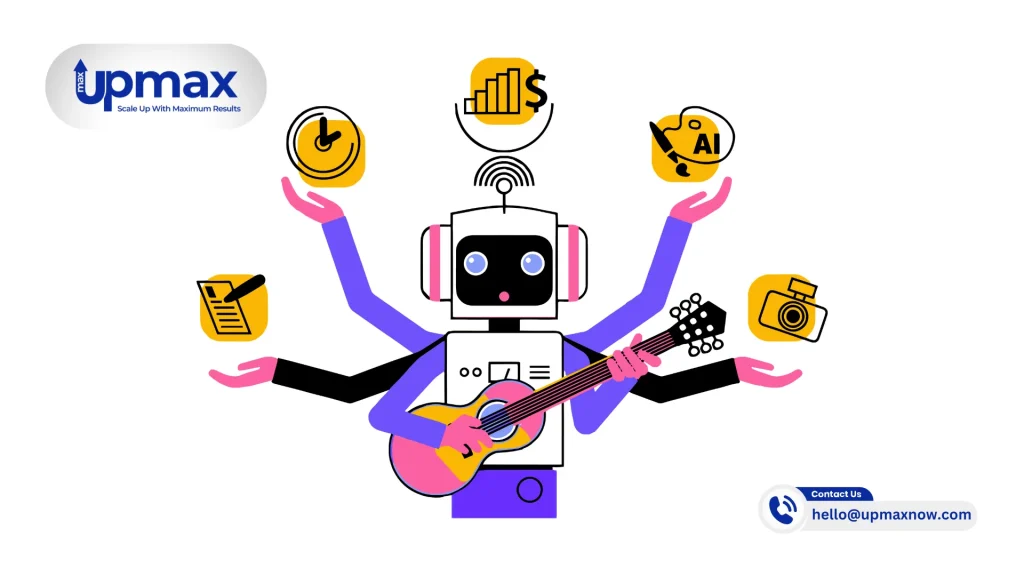
Key Components of AI in Digital Marketing
AI automation in digital marketing encompasses several key components that revolutionize marketing strategies. Upmax Digital Marketing and Growth Partner utilizes advanced AI technologies to enhance data analysis, customer segmentation, and predictive modeling. These AI-driven tools enable marketers to gain deeper insights into consumer behavior and optimize their campaigns for maximum impact.
The integration of AI in digital marketing extends to content creation, personalization, and real-time optimization. By leveraging machine learning algorithms, marketers can automate ad copy generation, email marketing, and social media management tasks. This automation allows marketing professionals to focus on strategic planning and creative aspects while AI handles data-intensive processes, improving overall efficiency and effectiveness in the digital marketing landscape.
Enhancing Marketing Strategies Through AI Automation
AI automation enhances marketing strategies by leveraging advanced technology for improved data analysis, personalized customer experiences, and streamlined campaigns. This digital transformation utilizes natural language processing and business process automation to optimize workflows. By integrating AI tools, marketers can achieve greater efficiency and effectiveness in their digital marketing efforts.
Utilizing AI for Improved Data Analysis
AI automation revolutionizes data analysis in digital marketing, enabling insurance companies and industry giants like IBM to process vast amounts of information rapidly. By leveraging intelligent automation and robotic process automation, marketers can uncover hidden patterns and trends that drive strategic decision-making. This enhanced analytical capability allows for more precise targeting and personalization in marketing campaigns.
Integrating AI automation in data analysis streamlines the evaluation of customer behavior, market trends, and campaign performance. Marketers can now access real-time insights, allowing agile strategy adjustments and improved ROI. Combining AI and robotic process automation empowers businesses to automate routine data tasks, freeing resources for more complex analytical endeavors. This efficiency boost translates to more informed marketing decisions and optimized customer experiences across various platforms.
- Implement AI-powered data analysis tools
- Leverage robotic process automation for routine tasks
- Utilize intelligent automation for real-time insights
- Apply AI-driven predictive modeling for strategic planning
- Integrate AI automation across marketing channels for cohesive analysis
Personalizing Customer Experiences With Automation
AI automation enhances customer experiences through personalized interactions driven by advanced algorithms and language processing. By leveraging artificial intelligence, marketers can analyze vast amounts of customer data to create tailored content and product recommendations. This productivity-boosting approach allows businesses to deliver relevant messages at the right time, increasing engagement and conversion rates.
Test automation is crucial in refining personalization strategies, enabling marketers to optimize customer experiences continuously. AI-powered systems can conduct rapid A/B testing, analyzing user behavior and preferences to fine-tune personalization algorithms. This iterative process ensures that marketing efforts remain practical and relevant, adapting to changing customer needs and market trends:
|
AI Automation Element |
Impact on Customer Experience |
|---|---|
|
Data Analysis |
Personalized recommendations |
|
Language Processing |
Tailored communication |
|
Test Automation |
Continuous optimization |
| Predictive Algorithms |
Anticipatory customer service |
Streamlining Marketing Campaigns Using AI Tools
AI tools streamline marketing campaigns by automating various aspects of campaign management, from content creation to performance analysis. These tools leverage machine learning algorithms to optimize campaign parameters, enhance usability, and improve the overall interface for marketers. By integrating AI-powered automation, businesses can significantly reduce manual tasks and focus on strategic decision-making.
Chatbots and AI-driven customer service platforms are crucial in streamlining marketing campaigns by providing instant, personalized interactions with potential customers. These automated systems can handle inquiries, qualify leads, and guide users through the sales funnel, enhancing the efficiency of marketing efforts. The seamless integration of AI automation in marketing campaigns ensures consistent messaging and improved customer experiences across multiple touchpoints.
Implementing AI Automation Tools for Maximum Efficiency
Implementing AI automation tools in digital marketing requires careful selection and integration. This section explores leading AI tools, essential features for automation solutions, and steps to incorporate these tools into existing workflows. By leveraging DevOps practices and selecting the right software, marketers can enhance their experience, streamline information processing, and maximize efficiency with AI-powered tools.
Overview of Leading AI Tools for Digital Marketing
Leading AI tools for digital marketing harness cloud computing to deliver powerful analytics and automation capabilities. These solutions leverage advanced algorithms to process customer data, enabling marketers to gain deep insights and improve campaign efficiency. From chatbots to predictive analytics platforms, AI-driven tools are revolutionizing how businesses interact with their audience and optimize marketing strategies.
AI-powered robots and virtual assistants are becoming integral to digital marketing operations, handling tasks such as content curation, social media management, and customer support. By automating routine processes, these tools free up human resources to focus on creative and strategic initiatives. The integration of AI in marketing technology stacks allows for real-time optimization of campaigns, ensuring maximum efficiency and return on investment
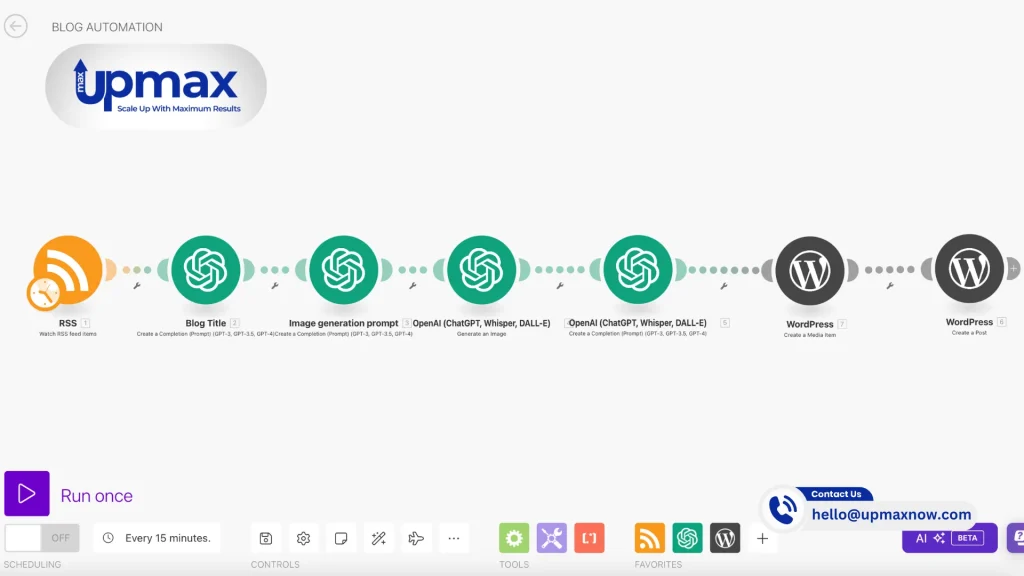
Key Features to Look for in AI Automation Solutions
When selecting AI automation solutions for digital marketing, organizations should prioritize tools that offer robust process mining capabilities. These features enable marketers to analyze and optimize workflows, identifying bottlenecks and opportunities for improved efficiency. Effective AI solutions should also integrate seamlessly with existing customer service platforms, enhancing the organization‘s ability to respond to client needs promptly and accurately.
AI automation tools should provide comprehensive management features that allow marketers to oversee and control various aspects of their campaigns from a centralized interface. This includes managing multiple channels, tracking performance metrics, and adjusting strategies in real-time. Additionally, advanced AI solutions should leverage computer vision and natural language processing to analyze customer interactions and provide actionable insights for improving marketing outcomes.
Steps to Integrate AI Tools Into Existing Marketing Workflows
Integrating AI tools into existing marketing workflows requires a strategic approach. Organizations must identify areas where AI can provide the most value, such as data analysis or machine learning applications. They should then select AI solutions that offer robust APIs for seamless integration with current systems, ensuring compatibility and efficiency.
The next step involves training teams on the new AI tools and establishing transparent processes for their use. This includes setting up data pipelines for AI-powered analytics and implementing computer vision technologies where applicable. Human oversight remains crucial to ensure AI outputs align with marketing goals and brand values. A phased integration approach allows for continuous refinement and optimization of AI-enhanced workflows:
|
Integration Phase |
Key Actions |
|---|---|
|
Assessment |
Identify integration points for AI tools |
|
Selection |
Choose AI solutions with compatible APIs |
| Implementation |
Set up data pipelines and train staff |
| Optimization |
Refine AI processes and monitor performance |
Measuring Success in AI-Driven Marketing Initiatives
Measuring success in AI-driven marketing initiatives is crucial for maximizing efficiency. This section explores key performance indicators for AI automation, analyzes return on investment from AI solutions, and discusses strategies for adjusting based on performance data. Businesses can optimize their AI-driven marketing efforts by focusing on market intelligence and innovation in software development and mobile apps.
Key Performance Indicators (KPIs) for AI Automation
Key Performance Indicators (KPIs) for AI automation in digital marketing focus on measuring the efficiency and effectiveness of artificial neural networks in enhancing marketing strategies. These KPIs include metrics such as conversion rates, customer engagement levels, and the speed of information processing, which directly reflect the impact of AI on marketing performance. By tracking these indicators, marketers can assess how well AI technologies improve accessibility to target audiences and optimize internet-based campaigns.
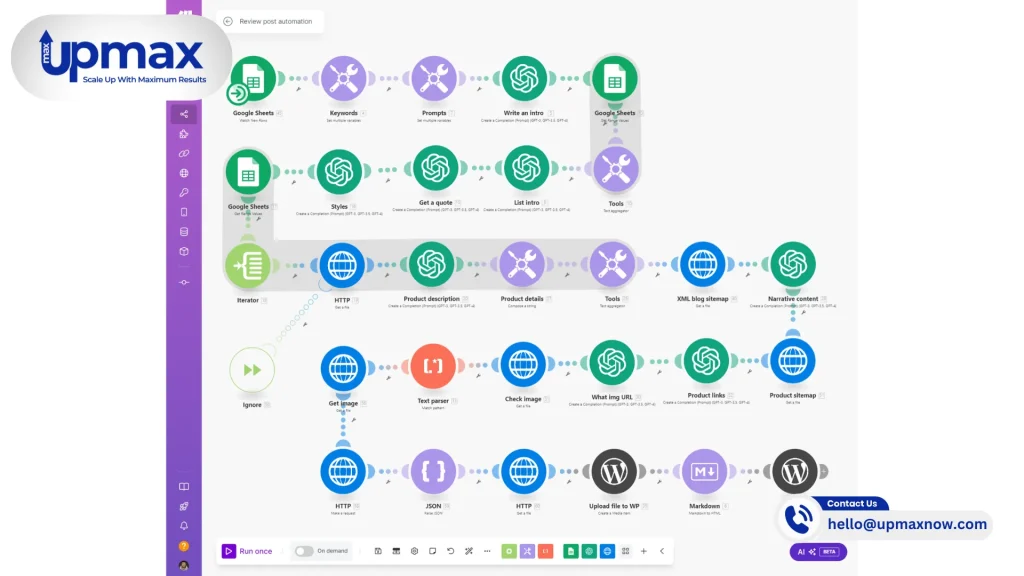
AI-driven KPIs also encompass employment-related metrics, such as reduced manual labor hours and increased productivity of marketing teams. Information technology is crucial in gathering and analyzing these metrics, enabling marketers to make data-driven decisions and continuously refine their AI automation strategies. By monitoring these KPIs, businesses can ensure their AI investments deliver tangible benefits and drive overall marketing success.
Analyzing Return on Investment (ROI) From AI Solutions
Analyzing the return on investment (ROI) from AI solutions involves evaluating the impact of deep learning technologies on key business metrics. Organizations measure improvements in customer experience, sales performance, and operational efficiency to determine the value of their AI investments. Best practices include tracking metrics such as increased conversion rates, reduced customer service response times, and enhanced user interface interactions.
Salesforce and other AI-powered platforms provide robust analytics tools to quantify the ROI of AI implementations. These tools enable businesses to measure the direct impact of AI on revenue generation, cost reduction, and customer satisfaction. By comparing pre-and post-implementation data, companies can assess the tangible benefits of AI automation in their digital marketing strategies:
| AI Solution | ROI Metric | Impact |
|---|---|---|
|
Chatbots |
Customer Service Efficiency | 30% reduction in response time |
|
Predictive Analytics |
Lead Conversion Rate | 15% increase in successful conversions |
| Personalization Engines | Customer Lifetime Value |
20% growth in repeat purchases |
| AI-Powered CRM | Sales Productivity |
25% increase in closed deals |
Adjusting Strategies Based on Performance Data
Adjusting strategies based on performance data is crucial for optimizing AI-driven marketing initiatives. Marketers can refine their approaches to minimize risk and maximize efficiency by continuously analyzing system behavior and learning from past campaigns. This iterative process allows real-time adjustments to targeting, messaging, and resource allocation, ensuring that marketing efforts remain aligned with business objectives.
Performance data provides valuable insights into consumer behavior, enabling marketers to adapt their strategies to changing market conditions. By leveraging AI-powered analytics tools, organizations can identify patterns and trends that may impact their tax planning and financial plan. This data-driven approach allows for more accurate forecasting and informed decision-making, improving marketing outcomes and increasing return on investment.
Case Studies Highlighting Successful AI Automation in Digital Marketing
This section examines successful AI automation in digital marketing through real-world case studies. It explores effective advertising and image recognition implementations, drawing lessons from triumphant campaigns. The analysis also delves into future trends, focusing on advancements in neural networks and predictive science. It provides valuable insights for marketers seeking to leverage AI for improved efficiency.
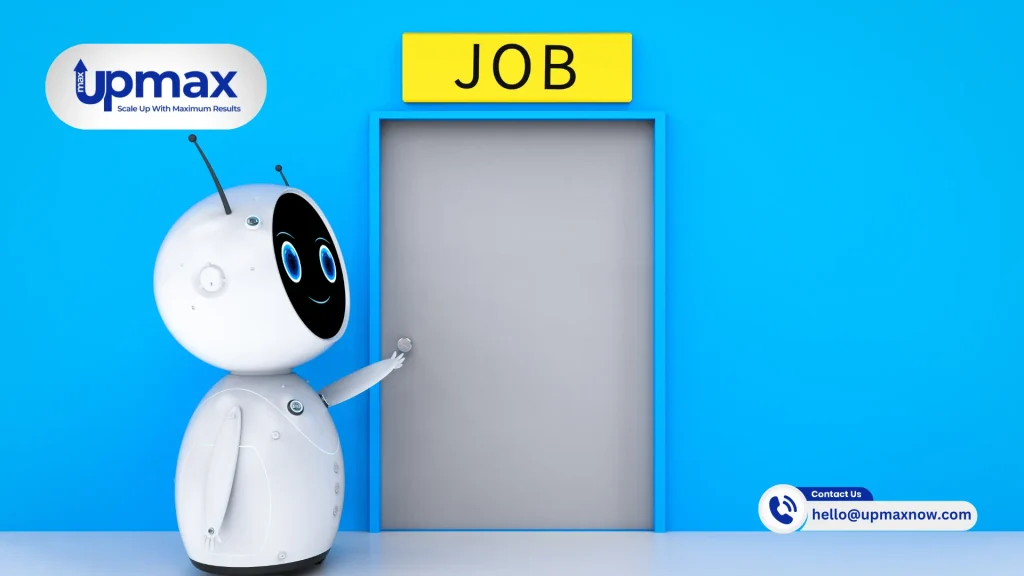
Real-World Examples of AI Implementations
The adoption of AI automation in digital marketing has revolutionized the way companies approach customer engagement and data analysis. A prominent example is Netflix’s implementation of AI-powered predictive analytics to personalize user content recommendations. This system analyzes viewing habits, search history, and user ratings to suggest relevant shows and movies, significantly improving user experience and retention rates.
In the e-commerce sector, Amazon has leveraged AI to optimize its supply chain and personalize product recommendations. The company‘s AI algorithms analyze vast amounts of data, including browser history and purchase patterns, to predict consumer behavior and streamline inventory management. This advanced application of data science has enhanced customer satisfaction and contributed to the company‘s dominant position in the digital economy.
- Netflix: AI-driven content recommendations
- Amazon: Personalized product suggestions and inventory optimization
- Google: AI-powered search algorithms and ad targeting
- Spotify: Customized playlists based on listening habits
- Salesforce: AI-enhanced customer relationship management
Lessons Learned From Successful Campaigns
Successful AI automation campaigns in digital marketing have demonstrated the importance of thorough research and concept development. Companies that invest time understanding their target audience and market dynamics gain a significant competitive advantage. These campaigns also highlighted the need for a precise data usage and privacy policy, ensuring compliance with regulations while maximizing the benefits of AI-driven insights.
Visibility emerged as a crucial factor in the success of AI-powered marketing initiatives. Campaigns that effectively communicated the value of AI-enhanced personalization to customers saw higher engagement rates. Organizations that maintained transparency about their use of AI technologies built trust with their audience, leading to improved customer relationships and increased brand loyalty.
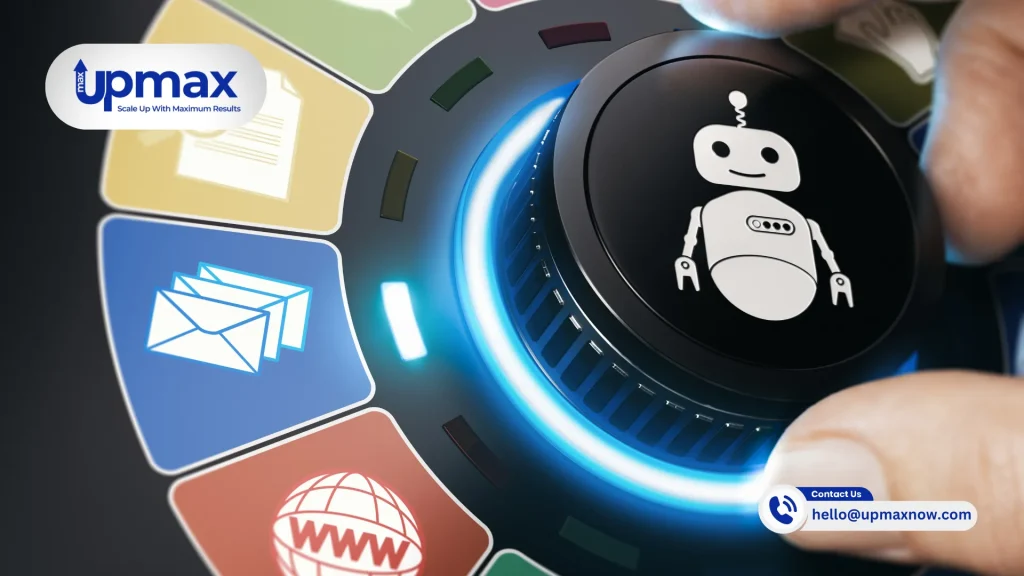
Future Trends Observed From Case Studies
Case studies reveal a growing trend in AI automation for mining and manufacturing companies, with advanced algorithms optimizing operations and predictive maintenance. These industries leverage AI to enhance safety protocols, streamline production processes, and improve resource allocation, resulting in significant efficiency gains and cost reductions. Integrating AI-powered conversational interfaces has also emerged as a key trend, enabling more natural and effective communication between systems and users.
Another notable trend is the increasing use of AI in creating comprehensive FAQ systems and intelligent knowledge bases. Companies across sectors are implementing AI-driven solutions to analyze customer inquiries and provide instant, accurate responses. This trend improves customer satisfaction and reduces the workload on human support teams, allowing them to focus on more complex issues and strategic tasks.
Addressing Common Challenges in AI Automation for Marketing
Implementing AI automation in digital marketing presents challenges that organizations must address to maximize efficiency. This section explores strategies for overcoming resistance to new technologies, ensuring data privacy and ethical considerations, and managing the transition from manual to automated processes. By leveraging document automation and intelligent document processing, companies can enable smoother adoption of automation tools and platforms.
Overcoming Resistance to New Technologies
Overcoming resistance to new technologies in AI automation requires a strategic approach focused on education and demonstrating tangible benefits. Organizations can invest in comprehensive training programs highlighting the advantages of business automation and automation software, showcasing how these tools streamline processes and improve efficiency. By providing hands-on experience with automation platforms, companies can alleviate concerns and build employee confidence using AI-driven solutions.
To address skepticism, businesses should emphasize the long-term value of AI automation investments, particularly in data extraction and analysis areas. Demonstrating how automation reduces manual errors, accelerates decision-making, and frees up resources for more strategic tasks can help overcome resistance. Additionally, implementing a phased approach to introducing new technologies allows teams to adapt gradually, minimizing disruption and fostering a culture of continuous improvement and innovation.
Ensuring Data Privacy and Ethical Considerations
Ensuring data privacy and ethical considerations in AI automation requires a robust framework grounded in computer science principles. Organizations must implement stringent security measures to protect sensitive information throughout the document lifecycle, from collection to processing and storage. This includes encryption, access controls, and regular security audits to safeguard against unauthorized access and data breaches.
Ethical AI practices demand transparency and accountability in automated decision-making processes. Companies should establish clear guidelines for AI engine development and deployment, fostering collaboration between technical teams and ethics committees. Regular feedback loops and impact assessments help identify potential biases or unintended consequences, ensuring that AI automation aligns with ethical standards and respects user privacy.
Managing the Transition From Manual to Automated Processes
Managing the transition from manual to automated processes requires a strategic approach that combines problem-solving and human intelligence. Organizations must comprehensively understand their existing workflows and identify areas where AI automation can provide the most significant benefits. This process involves careful orchestration of resources, including technology infrastructure, employee training, and change management strategies to ensure a smooth transition.
Looking to the future, successful transitions to automated processes hinge on fostering a culture of continuous learning and adaptation. Companies should encourage employees to develop skills that complement AI technologies, focusing on areas where human intelligence excels, such as creative thinking and complex decision-making. By emphasizing the collaborative potential between humans and AI, organizations can create a more efficient and innovative work environment that maximizes the benefits of automation while maintaining the irreplaceable value of human expertise.
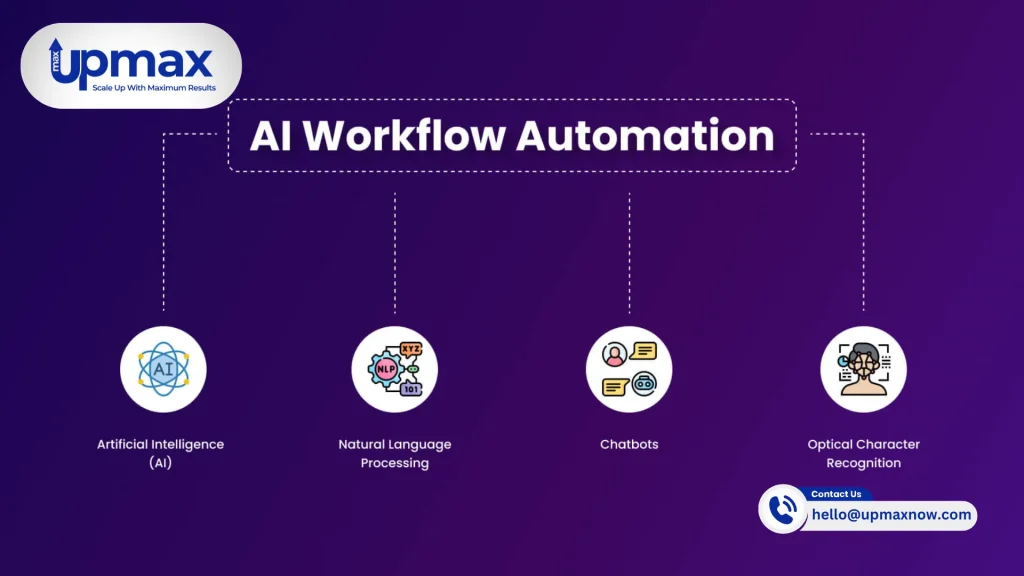
The Future of AI Automation in Digital Marketing
The future of AI automation in digital marketing promises significant advancements in business process management and web applications. This section explores predicted innovations, evolving consumer expectations influencing AI technologies, and anticipated changes in marketing job roles. As privacy concerns and knowledge requirements evolve, marketers must fully adapt their infrastructure to leverage AI’s potential.
Predicted Innovations on the Horizon
Advancements in AI-driven data collection and web scraping technologies are poised to revolutionize digital marketing strategies. These innovations will enable marketers to gather more comprehensive and accurate consumer insights, leading to highly targeted campaigns. Additionally, AI-powered speech recognition systems are expected to enhance customer interactions, providing personalized experiences across various platforms.
Integrating AI with credit card transaction data is anticipated to offer unprecedented opportunities for personalized marketing. This innovation will allow marketers to create tailored offers based on individual spending patterns while maintaining strict privacy standards. Furthermore, AI automation in education-focused marketing is projected to grow, enabling institutions to deliver customized learning experiences and targeted promotional content to prospective students.
Evolving Consumer Expectation Influencing AI Technologies
Consumer expectations are rapidly evolving, driving AI technologies to become more sophisticated in their ability to provide personalized experiences. Digital marketing experts focus on developing AI systems that can more accurately anticipate and respond to individual preferences. This shift requires robust governance frameworks to ensure that AI-driven interactions align with consumer privacy concerns and ethical standards.
Companies are investing in scalable AI solutions that can adapt to changing consumer behaviors to meet these evolving expectations. These systems leverage comprehensive knowledge bases to deliver relevant real-time content and offers. Human resources departments are also adapting and training staff to work alongside AI technologies and interpret complex data insights. This ensures a balance between automated efficiency and human expertise in customer interactions.
Anticipated Changes in Marketing Job Roles
Integrating AI automation in digital marketing reshapes marketing job roles, with professionals increasingly focusing on strategic oversight and creative problem-solving. Marketers are adapting to work alongside AI-powered tools, such as OpenAI Codex and advanced language models, to enhance communication strategies and achieve marketing goals more efficiently. This shift requires professionals to develop new skills in AI implementation, data interpretation, and sentiment analysis to leverage these technologies effectively.
As AI takes over routine tasks, marketing roles are evolving to emphasize human creativity and emotional intelligence. Professionals are now expected to focus on developing nuanced marketing strategies that complement AI-driven insights, ensuring that automated communications align with brand values and resonate with target audiences. This evolution demands a deeper understanding of AI capabilities and limitations, enabling marketers to set realistic goals and optimize the synergy between human expertise and AI-powered tools in digital marketing campaigns.
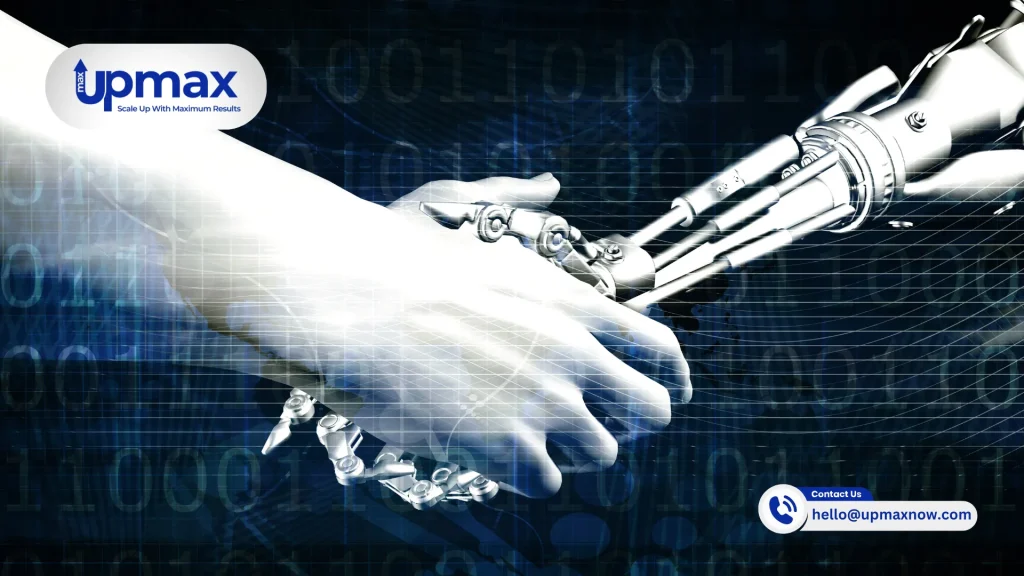
Educating Teams on AI Automation Tools and Strategies
Educating teams on AI automation tools and strategies is crucial for maximizing efficiency in digital marketing. This section explores training resources for marketing teams, fostering continuous learning, and collaborative approaches between tech and marketing departments. By focusing on user experience, process optimization, and leveraging tools like Zapier, teams can enhance speed and effectiveness in financial services and other sectors.
Training Resources for Marketing Teams
Marketing teams can enhance their AI automation skills through comprehensive online courses and workshops tailored to the digital marketing landscape. These resources offer hands-on experience with AI tools and allow teams to practice scenarios that mirror real-world complexities. Marketers develop the necessary expertise to execute AI-driven strategies effectively by engaging in practical exercises.
Industry conferences and webinars provide valuable insights into emerging AI trends and best practices in digital marketing. These events offer opportunities for marketers to learn from experts and peers, gaining a deeper understanding of AI‘s potential in various marketing scenarios. To maximize learning outcomes, teams should create a structured training program that combines theoretical knowledge with practical application:
| Training Component | Focus Area | Skill Development |
|---|---|---|
|
Online Courses |
AI Fundamentals | Technical Understanding |
|
Workshops |
Tool-Specific Training | Practical Application |
| Conferences | Industry Trends |
Strategic Insight |
| Hands-on Projects | Real-world Scenarios |
Problem-solving |
Fostering a Culture of Continuous Learning
Fostering a culture of continuous learning in AI automation requires organizations to prioritize ongoing education in programming languages and security practices. By encouraging teams to stay updated with the latest developments in marketing automation and forecasting techniques, companies can ensure their digital marketing strategies remain effective and secure. Regular training sessions on tools like Selenium for web automation can enhance the team’s technical proficiency and drive innovation in marketing processes.
Organizations should implement mentorship programs and cross-functional collaboration opportunities to support continuous learning. These initiatives allow experienced professionals to share their expertise in predictive modeling and data security while fostering a collaborative environment where marketing and IT teams can collaborate on AI-driven projects. Companies can build robust marketing automation systems that adapt to evolving industry trends and consumer behaviors by creating a learning ecosystem that values knowledge sharing and skill development.
Collaborative Approaches Between Tech and Marketing
Effective collaboration between tech and marketing teams is crucial for maximizing AI automation in digital marketing. Organizations should establish clear communication channels and shared goals, ensuring that both departments understand AI-driven campaigns’ privacy policy implications and technical requirements. By creating cross-functional teams, companies can leverage the expertise of tech professionals skilled in scripting languages, and marketers focused on sales outcomes, resulting in more efficient and targeted automation strategies.
Businesses should implement a unified pipeline for project management and data sharing to facilitate seamless collaboration. This approach allows the workforce to align their efforts, with tech teams providing insights on AI capabilities and marketing teams offering input on customer needs and campaign objectives. Regular joint workshops and training sessions help bridge knowledge gaps, enabling both departments to contribute effectively to developing and optimizing AI-powered marketing initiatives.
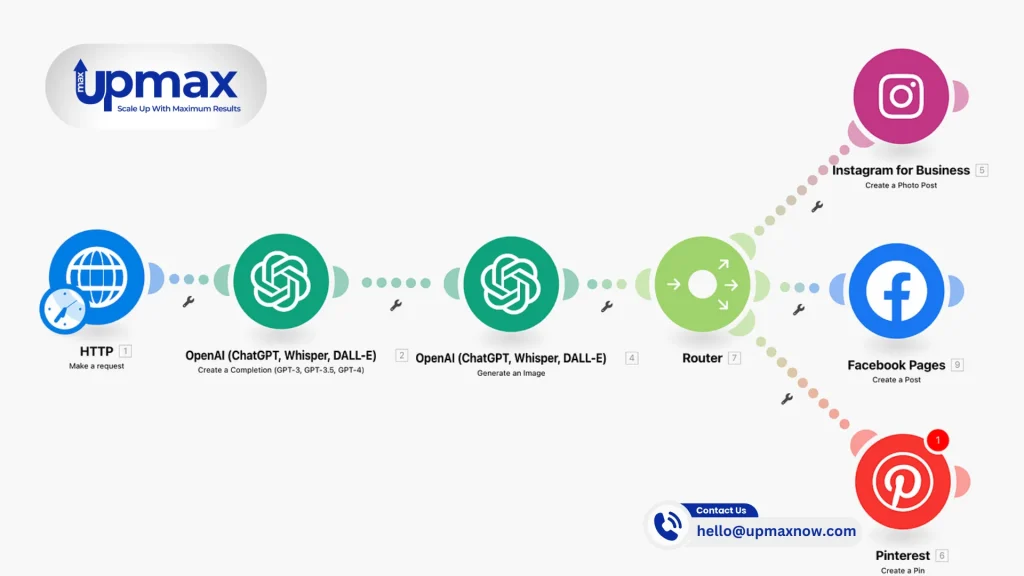
Best Practices for Maximizing Efficiency With AI Automation
Maximizing efficiency with AI automation in digital marketing requires strategically implementing best practices. This section explores regularly updating AI tools for peak performance, monitoring industry trends, and balancing automation with a human touch. By focusing on these areas, businesses can optimize their AI-driven marketing efforts, enhance customer support, streamline onboarding processes, and meet customer demand efficiently.
Regularly Updating AI Tools for Peak Performance
Regular updates to AI tools are crucial for maintaining peak performance in digital marketing strategies. Marketers can consistently refine algorithms and incorporate new data to ensure their content marketing efforts remain highly targeted and effective. These updates often include improvements in quality assurance processes, allowing for more accurate predictions and better alignment with the target audience‘s evolving needs.
Implementing a systematic approach to updating AI tools can significantly enhance their efficiency in analyzing consumer behavior and market trends. Marketers should establish a schedule for reviewing and optimizing their AI-powered systems, incorporating feedback from various sources to improve accuracy and relevance. This proactive strategy enables businesses to stay ahead of competitors and deliver more personalized experiences to their target audience, ultimately driving better results in their digital marketing campaigns.
Keeping an Eye on Industry Trends and Innovations
Staying abreast of industry trends and innovations is crucial for maximizing efficiency with AI automation in digital marketing. Marketers must regularly monitor advancements in AI technologies, such as natural language processing and predictive analytics, to identify opportunities for enhancing their automation strategies. By keeping informed about emerging tools and techniques, businesses can refine their customer segmentation, personalization, and campaign optimization approach.
Industry conferences, webinars, and trade publications are valuable resources for tracking AI innovations in digital marketing. Professionals should actively engage with these platforms to gain insights into successful implementations and potential pitfalls. This proactive approach enables marketers to swiftly adapt their AI automation practices, ensuring they leverage the most effective tools and methodologies to drive marketing performance and maintain a competitive edge in the rapidly evolving digital landscape.
Balancing Automation With Human Touch in Marketing
Balancing automation with the human touch in marketing requires a strategic approach that leverages AI‘s efficiency while preserving the personal connections crucial for customer engagement. Marketers must identify areas where automation can streamline processes without compromising the authenticity of brand interactions. This balance ensures that AI-driven campaigns maintain a human element, fostering consumer trust and loyalty.
Organizations should implement AI tools for data analysis and routine tasks to achieve this equilibrium while reserving human involvement for creative strategy and complex customer interactions. By doing so, marketers can enhance operational efficiency while delivering personalized experiences that resonate with their audience. The key lies in using AI to augment human capabilities rather than replace them entirely:
|
Task |
AI Automation Role | Human Touch Role |
|---|---|---|
|
Data Analysis |
Process large datasets | Interpret insights |
|
Content Creation |
Generate initial drafts |
Refine and personalize |
| Customer Service | Handle routine inquiries |
Manage complex issues |
| Campaign Optimization | Real-time performance tracking |
Strategic decision-making |
Upmax Digital Marketing: Experts in AI Automation for Digital Marketing
Upmax Digital Marketing leverages AI automation to revolutionize digital marketing strategies. This section explores Upmax‘s experience in implementing AI solutions, custom plans tailored to business needs, success stories of business transformations, and reasons to choose Upmax for AI automation. Through these topics, readers will gain insight into Upmax‘s expertise and the potential impact of AI on their marketing efforts.
Our Experience in Implementing AI Solutions for Clients
Upmax Digital Marketing has successfully implemented AI solutions for numerous clients across various industries, leveraging advanced technologies to enhance digital marketing strategies. The company‘s experienced team has developed and deployed custom AI-powered tools that optimize campaign performance, automate routine tasks, and provide deep insights into consumer behavior.
Upmax has consistently delivered measurable results through its implementations, including increased conversion rates, improved ROI on marketing spending, and enhanced customer engagement. Its expertise in integrating AI solutions with existing marketing frameworks has enabled clients to stay ahead of the competition and adapt quickly to changing market dynamics.
Custom AI Automation Strategies Tailored to Your Business Needs
Upmax Digital Marketing develops custom AI automation strategies tailored to client’s unique business needs and goals. Their team of experts analyzes existing marketing processes, identifies areas for improvement, and designs AI-powered solutions that seamlessly integrate with current systems. This personalized approach ensures that clients receive maximum value from their AI investments, addressing specific challenges and opportunities within their industry.
The company‘s tailored strategies encompass various AI applications, from predictive analytics for customer behavior to automated content generation and optimization. By leveraging machine learning algorithms and natural language processing, Upmax creates adaptive marketing campaigns that continuously improve performance based on real-time data. This customized approach allows businesses to stay agile in the rapidly evolving digital landscape while maximizing their marketing efficiency and ROI.
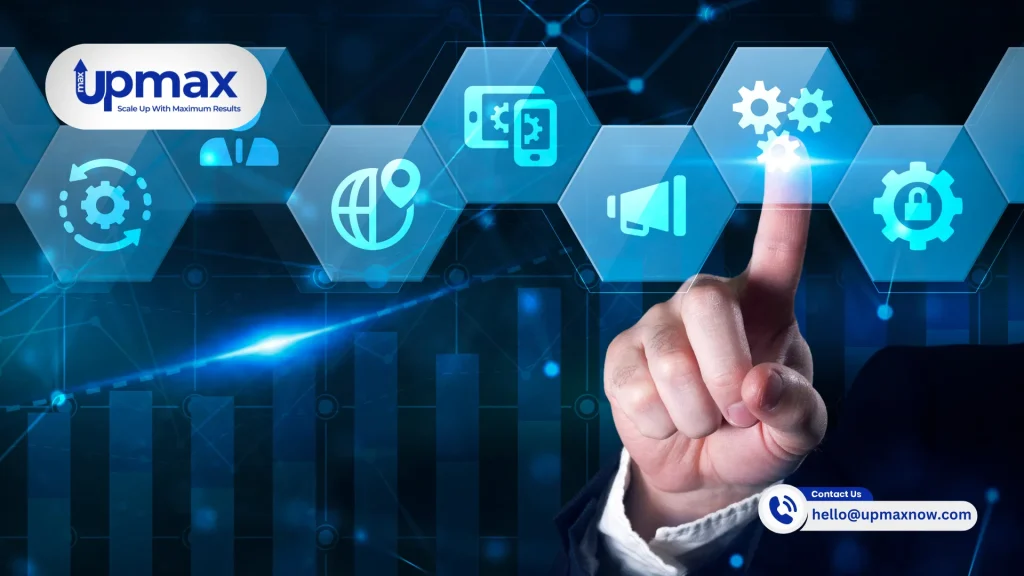
Success Stories: How Upmax Transformed Businesses with AI
Upmax Digital Marketing has transformed numerous businesses through its innovative AI automation solutions. One notable success story involves a mid-sized e-commerce company that saw a 40% increase in conversion rates after implementing Upmax‘s AI-driven personalization engine. The system analyzed customer behavior patterns and preferences, delivering tailored product recommendations and optimizing the user experience across all digital touchpoints.
Another remarkable transformation occurred with a B2B software provider that leveraged Upmax‘s AI-powered lead scoring and nurturing system. The client experienced a 60% reduction in sales cycle length and a 25% increase in qualified leads. By automating prospect engagement and utilizing predictive analytics, the company significantly improved its sales efficiency and revenue generation, demonstrating the transformative power of AI in digital marketing strategies.
Why Choose Upmax for AI Automation in Your Digital Marketing Strategy
Upmax Digital Marketing is a top choice for AI automation in digital marketing strategies due to its proven track record of delivering measurable results. The company‘s team of experts combines deep industry knowledge with cutting-edge AI technologies to create tailored solutions that address specific business challenges. By choosing Upmax, organizations gain access to advanced AI tools and strategies that can significantly enhance their marketing efficiency and ROI.
Clients partnering with Upmax benefit from a comprehensive approach to AI automation encompassing data analysis, predictive modeling, and personalized customer experiences. The company‘s commitment to staying at the forefront of AI innovations ensures clients receive the most up-to-date and effective solutions for their digital marketing needs. With Upmax‘s expertise, businesses can confidently navigate the complex landscape of AI-driven marketing, achieving sustainable growth and competitive advantage in their respective industries.
FAQs for Maximizing Efficiency: AI Automation in Digital Marketing
What is AI automation?
AI automation refers to using artificial intelligence technologies to perform tasks that traditionally require human intervention. In digital marketing, AI automation enhances efficiency by streamlining processes such as data analysis, customer segmentation, and campaign optimization. By leveraging machine learning and predictive modeling, businesses can analyze vast amounts of data to gain real-time insights, personalize customer experiences, and optimize marketing strategies. Upmax Digital Marketing utilizes AI automation to improve marketing workflows and boost return on investment for clients.
Which AI is best for automation?
The best AI tools for automation in digital marketing vary based on specific needs, but some of the most effective include:
- HubSpot: Offers comprehensive inbound marketing tools with automation features for email campaigns and lead nurturing.
- Google Analytics: Provides AI-driven insights for understanding user behavior and forecasting trends.
- Intercom and Drift: These platforms deploy AI-powered chatbots that enhance customer engagement and support. These tools enable businesses to automate repetitive tasks, allowing teams to focus on strategy and creativity, thus improving overall business growth.
What are the four types of AI technology?
The four main types of AI technology include:
- Reactive Machines: These systems can only react to current situations without the ability to learn from past experiences.
- Limited Memory: This type can learn from historical data and make decisions based on that information. It is commonly used in machine learning applications.
- Theory of Mind: This advanced type aims to understand human emotions and social interactions but is still largely theoretical in practical applications.
- Self-aware AI: This is a future concept in which machines possess self-awareness and consciousness, which is not realized in any existing technology. Upmax Digital Marketing focuses on leveraging limited-memory AI for effective data-driven decision-making.
How to learn AI automation?
To learn AI automation effectively, consider the following steps:
- Understand the Basics of AI and Machine Learning: Familiarize yourself with fundamental concepts through online courses or tutorials.
- Explore Automation Tools: Experiment with tools like Python for scripting or platforms like Zapier for simple automation tasks.
- Engage with Online Communities: Join forums or groups focused on AI and digital marketing to share experiences and learn from others.
- Build Projects: Start small by automating simple tasks in your marketing workflows, gradually increasing complexity as your skills improve. Upmax Digital Marketing offers resources and guidance for those seeking to enhance their knowledge.
How to use AI to automate work?
Using AI to automate work involves integrating various tools and technologies into your workflow:
- Implement Automation Tools: Utilize platforms like HubSpot or Google Analytics to automate data collection and analysis tasks.
- Leverage Chatbots: Deploy chatbots for customer service inquiries, freeing human resources for more complex issues.
- Optimize Campaigns with Predictive Analytics: AI-driven insights can tailor marketing strategies based on predicted customer behavior, enhancing personalization efforts.
- Streamline Content Creation: Employ AI tools to generate content ideas or draft posts. These tools can significantly reduce the time spent on these tasks while maintaining quality. Upmax Digital Marketing uses these strategies to enhance client success through effective automation.
By focusing on these aspects of AI automation, businesses can significantly improve their digital marketing efficiency while delivering personalized customer experiences that drive growth.
Can ChatGPT be automated?
Yes, ChatGPT and other large language models can be automated within various digital marketing workflows. While ChatGPT itself isn’t directly automated in the sense of a self-acting entity, its functionalities can be integrated with automation tools and platforms. For example, using ChatGPT’s API, you can automate content creation tasks like drafting social media posts, writing product descriptions, or generating email newsletters.
Furthermore, AI automation can leverage ChatGPT to personalize customer interactions through chatbots, providing real-time support and enhancing customer experiences. At Upmax Digital Marketing, we use AI automation and tools like ChatGPT to streamline marketing workflows, freeing up time for strategic initiatives and maximizing our client’s return on investment.
How to use AI in home automation?
While this question focuses on home automation, the principles of AI automation apply across various fields, including digital marketing. In digital marketing, AI can automate tasks like campaign optimization for PPC ads and SEO, data analysis for customer segmentation, and content creation tailored to specific audiences. Upmax Digital Marketing leverages these AI automation tools to enhance efficiency and deliver data-driven marketing strategies. For example, predictive modeling based on machine learning can anticipate customer behavior, allowing for proactive campaign adjustments and personalized messaging. This customized approach improves customer experiences and drives conversions.
Can AI work on their own?
Currently, AI operates within predefined parameters and requires human oversight. While AI automation can handle many tasks independently, such as data analysis, campaign optimization, and content generation, human intervention is essential for setting goals, defining strategies, and addressing ethical considerations. Think of AI as a powerful tool that amplifies human capabilities. At Upmax Digital Marketing, our experts use AI automation tools to develop and implement effective marketing strategies. We leverage AI’s power in data analysis, predictive modeling, and real-time insights to refine our approach and maximize client results.
What is AI automation with example?
AI automation uses artificial intelligence to perform tasks typically requiring human intervention. In digital marketing, this translates to automating repetitive tasks and leveraging machine learning for data-driven decision-making. A practical example is using AI to analyze large datasets to identify key customer segments. This information then informs personalized marketing campaigns across various channels, from social media to email marketing. Another example is using AI-powered tools to optimize real-time PPC ads, adjusting bids and targeting based on performance data. Upmax Digital Marketing uses AI automation to streamline these processes, enhancing efficiency and improving return on investment for our clients. We utilize AI automation tools to personalize customer experiences, optimize marketing workflows, and deliver superior results.
What is the future of AI?
The future of AI in digital marketing promises increased personalization, enhanced efficiency, and more sophisticated data analysis. We expect AI to play an even more significant role in predictive modeling, campaign optimization, and content creation. This will empower marketers to deliver highly targeted campaigns, optimize customer experiences at every touchpoint, and achieve greater return on investment. Upmax Digital Marketing is at the forefront of these advancements, continually exploring and implementing innovative AI automation solutions to help our clients stay ahead of the curve and achieve their business goals. AI is the future of digital marketing, and we’re committed to leveraging its power to drive growth for our clients.
Is Siri an AI?
Yes, Siri is an AI. Specifically, Siri is a virtual assistant that uses artificial intelligence to perform tasks, provide information, and answer questions using voice commands. AI powers Siri’s ability to understand and process natural language, enabling it to interact with users seamlessly. It leverages machine learning and predictive modeling to improve its responses and offer personalized user experiences over time.
Is AI difficult to learn?
Learning AI can vary in difficulty depending on your background and the depth of knowledge you wish to acquire. Basic concepts like machine learning, data analysis, and automation tools can be straightforward with the right resources. However, mastering AI may require more advanced understanding and practice, particularly in areas like deep learning, predictive modeling, or real-time insights. Upmax Digital Marketing offers expertise in AI automation to help businesses enhance their digital marketing strategies without needing deep technical knowledge.
Which is better: AI or automation?
AI and automation serve different purposes but can be highly effective when combined. Automation involves creating automatic processes, improving efficiency, and reducing manual effort. AI adds an intelligence layer to these processes, allowing for decision-making, predictive analytics, and personalization. In digital marketing, AI automation, like the solutions provided by Upmax Digital Marketing, enhances efficiency by optimizing marketing workflows, customer segmentation, and campaign optimization. This offers better customer experiences and a higher return on investment.
What is AI really used for?
AI is used across various industries to enhance efficiency, analyze data, and personalize experiences. In digital marketing, AI helps with tasks like SEO, PPC ads, content creation, customer segmentation, and real-time insights. Companies like Upmax Digital Marketing use AI automation to streamline marketing workflows, optimize campaigns, and provide predictive modeling for better marketing strategies, ultimately driving business growth and improving customer experiences.
How to make automation with AI?
Creating automation with AI involves integrating intelligent systems into your existing processes to perform tasks autonomously. Start by identifying repetitive tasks that can benefit from automation, such as data analysis or campaign optimization. Then, AI tools for machine learning and predictive modeling will enhance these processes with real-time insights and personalization. Upmax Digital Marketing specializes in deploying AI automation tools that enhance efficiency, optimize marketing strategies, and improve customer segmentation, leading to more effective digital marketing efforts and higher return on investment.
Which jobs are most impacted by AI automation in digital marketing?
While AI automation is transforming various aspects of digital marketing, it’s essential to understand that it’s primarily enhancing rather than replacing human roles. Repetitive tasks in data analysis, campaign optimization, and basic content creation are automated, allowing marketing professionals to focus on strategic decision-making and creative initiatives. At Upmax Digital Marketing, this shift creates new opportunities for marketers to upskill and focus on high-value activities like strategy development and personalized customer experiences.
Our machine-learning algorithms and automation tools handle routine tasks such as data processing and campaign adjustments. At the same time, our marketing experts leverage these insights to develop sophisticated marketing strategies that drive business growth. This synergy between AI automation and human expertise has proven to deliver superior returns on investment for our clients.
Is ChatGPT the leading solution for AI automation in digital marketing?
While ChatGPT has gained significant attention, it’s just one tool in the broader AI ecosystem. Businesses need integrated AI automation solutions that address marketing challenges for comprehensive digital marketing success. Upmax Digital Marketing utilizes a sophisticated suite of AI tools and custom automation workflows beyond essential text generation to deliver real-time insights, advanced customer segmentation, and predictive modeling capabilities.
Our platform combines multiple AI technologies to optimize various aspects of digital marketing, from PPC ads to SEO strategies, ensuring more efficient and effective marketing operations. This comprehensive approach to AI automation helps businesses achieve better results than standalone AI tools.
Can businesses generate revenue through AI automation in digital marketing?
Absolutely. When implemented strategically, AI automation can significantly boost revenue by improving marketing efficiency and effectiveness. Upmax Digital Marketing’s AI-powered solutions have helped businesses substantially improve their marketing ROI. Our automation tools optimize marketing workflows, enhance customer experiences through personalized content delivery, and provide data-driven insights for better decision-making.
Key revenue-generating benefits include:
- Reduced operational costs through automated campaign optimization
- Improved customer targeting through advanced segmentation
- Enhanced content creation efficiency
- Better allocation of marketing budgets based on predictive modeling
- Increased conversion rates through personalized customer experiences
How does AI automation intelligence compare to human expertise in digital marketing?
It’s more productive to understand how AI and human intelligence complement each other rather than compare them. AI automation excels at processing vast amounts of data, identifying patterns, and precisely executing repetitive tasks. However, human marketers bring creativity, emotional intelligence, and strategic thinking that AI cannot replicate.
At Upmax Digital Marketing, we’ve developed a balanced approach. AI automation handles data analysis, campaign optimization, and routine tasks, while our marketing experts focus on strategy development, creative direction, and building meaningful customer relationships. This combination of AI efficiency and human insight delivers superior marketing results for our clients.
Our chatbots and automated systems enhance customer service while allowing our team to focus on complex problem-solving and strategic planning. This harmonious integration of AI automation and human expertise has proven the most effective approach for achieving marketing goals and driving business growth.
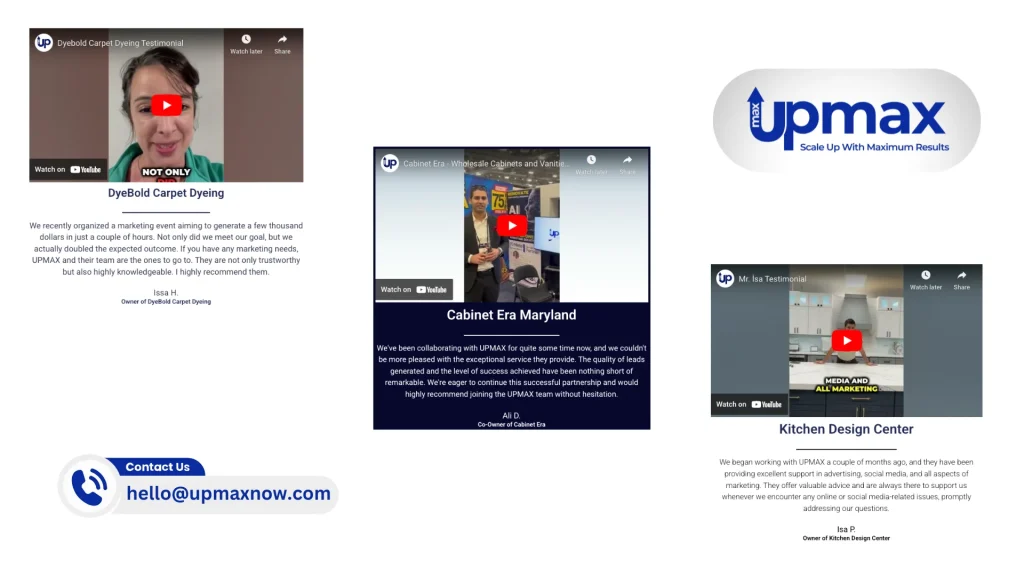
Hear from Our Delighted Clients About AI Automation and Upmax Digital Marketing
Issa H. – Owner of DyeBold Carpet Dyeing
UPMAX has proven its expertise in driving exceptional results through strategic event marketing. Their team helped us organize a marketing event that not only met but doubled our financial targets within hours. Their deep knowledge and trustworthy approach make them an invaluable partner for businesses seeking to maximize their marketing potential. I wholeheartedly recommend their services to companies looking to achieve remarkable results.
Ali D. – Co-Owner of Cabinet Era
Our long-standing partnership with UPMAX continues to exceed expectations in every aspect. Their innovative approach to lead generation has delivered outstanding results, demonstrating their expertise in digital marketing automation. Our consistent success speaks volumes about their capabilities. For businesses seeking a transformative marketing partnership, UPMAX is unquestionably the right choice.
Isa P. – Owner of Kitchen Design Center
UPMAX has revolutionized our digital presence through its comprehensive marketing support. Its expertise spans advertising, social media management, and strategic marketing initiatives. Its responsive approach to problem-solving and ability to provide actionable guidance across all digital platforms sets it apart. Its dedicated support ensures we stay ahead in the competitive online landscape.
Partner with UPMAX to harness the power of AI-driven digital marketing solutions, as demonstrated by our satisfied clients. Our expert team specializes in developing customized strategies that enhance your online presence, streamline operations, and drive measurable business growth. From social media management to strategic event marketing and lead generation, UPMAX consistently delivers results that transform businesses and exceed expectations.
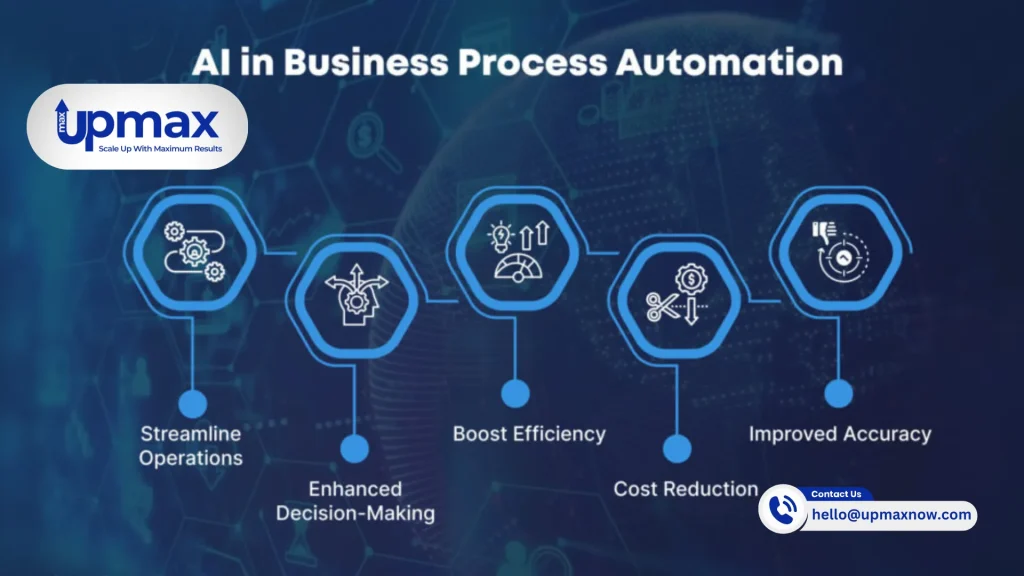
Conclusion
AI automation has revolutionized digital marketing, offering unprecedented efficiency and precision. By leveraging advanced technologies, marketers can streamline processes, enhance customer experiences, and drive better results.
Successful implementation of AI automation requires a strategic approach, focusing on key areas such as data analysis, personalization, and campaign optimization. Organizations must invest in the right tools and continuously update their strategies to stay competitive in the rapidly evolving digital landscape.
Upmax Digital Marketing has demonstrated expertise in implementing AI solutions and delivering customized strategies that drive tangible business outcomes. Their success stories highlight the transformative power of AI in digital marketing:
|
Client Type |
AI Solution | Result |
|---|---|---|
|
E-commerce Company |
AI-driven Personalization |
40% Increase in Conversion Rates |
| B2B Software Provider | AI-powered Lead Scoring |
60% Reduction in Sales Cycle |
As AI evolves, marketers must embrace these technologies to maximize efficiency and stay ahead of the competition. By partnering with experts like Upmax, businesses can harness the full potential of AI automation in their digital marketing strategies, driving growth and success in the digital age.
Located in Long Beach, Southern California, UPMAX combines cutting-edge AI technology with deep industry knowledge to deliver unparalleled marketing solutions tailored to your unique needs.
Visit us at upmaxnow.com to learn how we can elevate your business in the digital age.
For personalized assistance and inquiries, you can contact us at your trusted growth partner’s contact page.
Embrace the future of digital marketing with UPMAX, where innovation meets expertise.


